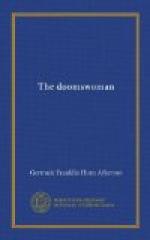The girls were a little frightened: this was not the Son to which they were accustomed. The young matrons frowned. The old people exclaimed, “Caramba!” “Mother of God!” “Holy Mary!” I was aghast; well as I knew her, this was a piece of audacity for which I was unprepared.
As the dance went on and she grew more and more like an untamed wood-nymph, even the caballeros became vaguely uneasy, hotly as they admired the beautiful wild thing enchaining their gaze. I looked again at Estenega and knew that his heart beat in passionate sympathy.
“I have found her,” he murmured, exultantly. “She is California, magnificent, audacious, incomprehensible, a creature of storms and convulsions and impregnable calm; the germs of all good and all bad in her; a woman sublimated. Every husk of tradition has fallen from her.”
Once, as she passed Estenega, her eyes met his. They lit with a glance of recognition, then the lids drooped and she floated on. He left the room; and when he returned she sat on a window-seat, surrounded by caballeros, as calm and as pale as when he had commanded her to dance. He did not approach her, but, joined me at the upper end of the sala, where I stood with Alvarado, the Castros, Don Thomas Larkin, the United States Consul, and a half-dozen others. We were discussing Chonita’s interpretation of El Son.
“That was a strange outbreak for a Spanish girl,” said Senor Larkin.
“She is Chonita Iturbi y Moncada,” said Castro, severely. “She is like no other woman, and what she does is right.”
The consul bowed. “True, coronel. I have seen no one here like Dona Chonita. There is a delicious uniformity about the Californian women: so reserved, shrinking yet dignified, ever on their guard. Dona Chonita changed so swiftly from the typical woman of her race to an houri, almost a bacchante,—only an extraordinary refinement of nature kept her this side of the line,—that an American would be tempted to call her eccentric.”
Alvarado lifted his hand and pointed through the window to the stars. “The golden coals in the blue fire of heaven are not higher above censure,” he said.
Dona Modeste raised her eyebrows. “Coals are safest when burned on the domestic hearth and carefully watched; safer still when they have fallen to ashes.”
“What is this rumor of pirates on the coast?” demanded Alvarado, abruptly.




